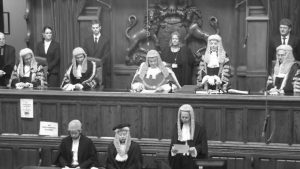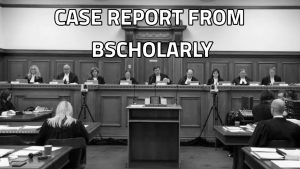Commissioner of Police, Ondo State & anor V Festus Ade Obolo– (1989) LCN/0074 (CA): This case establishes that the police are to make arrest only on reasonable ground of suspicion that a person has committed a criminal offence or is being prevented from committing a criminal offence. An arrest that runs short of this requirement amounts to violation of the citizen’s right to personal liberty. The test of ascertaining what amounts to a reasonable suspicion is an objective one, and the onus lies on the person making an arrest to show that the arrest was lawful.

Recommended: Donoghue v Stevenson, Facts, issues and decision of the court
Issues for Determination
a. The right to personal liberty.
b. The onus of proving a reasonable ground of suspicion leading to an arrest.
Recommended: Mojekwu v Mojekwu, Facts, issues and decision
Facts of The Case of COP V Obolo
The Appellant instituted an action in the High Court for the enforcement of his fundamental human right of personal liberty. The action was brought under the Fundamental Rights (Enforcement Procedure) Rules 1979. The case of the Applicant was that the respondents who are the police had him arrested, detained and subjected to inhuman treatments occasionally and on a routine basis whenever there is an alleged armed robbery case within the neigbourhood.

They had continued doing this to the Applicant since 1972 until the latest that necessitated the suit when he was arrested and detained in respect to another armed robbery case sometime in 1982. This they would usually do without informing him of his ground of arrest, and they had never charged him to a court of competent jurisdiction for trial.
The Applicant filed this fundamental human rights enforcement action praying the court for a declaration that this act of the police against him constitutes violation of his fundamental human right of personal liberty as guaranteed by the 1979 constitution. He also sought for an injunction retraining the Respondents from further violation of his fundamental human rights. He further claimed an exemplary and general damage of 500, 000 naira and a public apology to be tendered by the Respondents.
Also see: Differences between law and morality

Decision of the court in Commissioner of Police, Ondo State & anor V Festus Ade Obolo– (1989) LCN/0074 (CA)
The High Court held in favour of the Applicant and awarded the sum of 250, naira in his favour as compensatory damages. The Respondent being dissatisfied with the High Court’s decision against them filed an appeal to the Court of Appeal. Also the Applicant was dissatisfied with the sum awarded to him as damages. He thereon filed a cross-appeal in respect to the inadequacy of the damage awarded by the High Court. The Respondents (now Appellants) contends that the police have the power to make arrest upon reasonable suspicion that crime has been committed or is likely to be committed.
The Appellants also denies making the arrest, saying that the arrest, detention and investigation of which the Applicant/Respondent was involved in were made by the police team in Ore Police Station and not the Divisional Police Officer (DPO) of Okitipupa. The counsel to the Appellants submitted, relying on the case of Musoke V Uganda, that the nature of the case and investigations demands that the suspects be held in custody for a longer time. The court of Appeal did not agree to this submission as the case differed materially from the facts of the instant case. Going further, Court of Appeal held that the burden lies of the Appellant (the police) to show that the Respondent has been arrested to prevent his commission of crime or on a reasonable suspicion that he has committed in criminal offence.
Recommended: Countries with the best judicial system in the world
The burden of establishing that the ground of arrest was on a reasonable suspicion lies on the party making the arrest. It is after then that the burden shifts to the other party to prove that there was no reasonable ground of suspicion for the arrest. The court would then be left to ascertain what is reasonable on an objective basis. The Appellant according to the court, failed to establish in their affidavit that the Applicant/Respondent had done anything in relation to the alleged armed robbery case. The Appellants presented the court with no basis in order for the court to ascertain whether there was a ground for suspicion and if there was, whether it was a reasonable ground. They merely stated that his arrest was not unlawful. They presented no evidence to show the court that the arrest of the Respondent was lawful.
The Court of Appeal therefore held, affirming the decision of the High Court that there was no reasonable ground upon which the Respondent was arrested. The court also held that the test for ascertaining what is reasonable in every circumstance is the test of a reasonable man in the circumstance of the arrest who is well informed of the law and the circumstance surrounding the proposed arrest; that is, the objective test, and not a test of what is reasonable in the arrestee’s view, that is, the subjective test as was submitted by the Counsel to the Appellant.
The Court of Appeal dismissed the Appellant’s appeal for lack of merit.
On the issue of the Divisional Police Officer not being the party involved, as was contended by the Counsel to the Appellant, the court held that the office, Divisional Police Officer, Okitipupa is not a body known to law, but merely a body created for an administrative convenience. He is not a legal or juristic person and therefore cannot sue and be sued. The appeal on this ground was therefore allowed only to the extent of having the second Appellant struck out from the suit. The second Appellant’s name was struck out from the suit accordingly.
Also see: Facts, issues and decision of the court in Ukeje v ukeje
On the issue of the inadequacy of the damage awarded by the High Court, the Court of Appeal held that the Respondent was entitled to be awarded a substantial damage, taking into consideration certain factors which the Respondent was subject to as a result of the routine arrest, detention and investigation. Factors such as his reputation, time wasted, weight of the alleged offence, humiliation, emotional impact, discomfort, and so on.
The Court if Appeal further varied the sum of the damages awarded by the High Court to 17, 500 naira and an additional cost of 400 naira against the Appellant.

Edeh Samuel Chukwuemeka, ACMC, is a lawyer and a certified mediator/conciliator in Nigeria. He is also a developer with knowledge in various programming languages. Samuel is determined to leverage his skills in technology, SEO, and legal practice to revolutionize the legal profession worldwide by creating web and mobile applications that simplify legal research. Sam is also passionate about educating and providing valuable information to people.